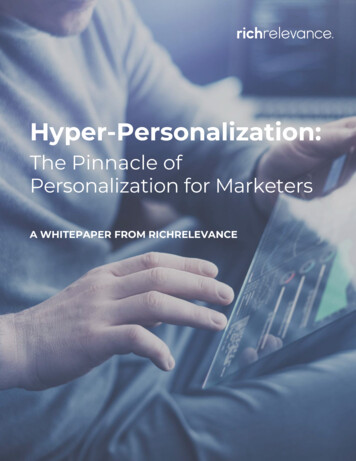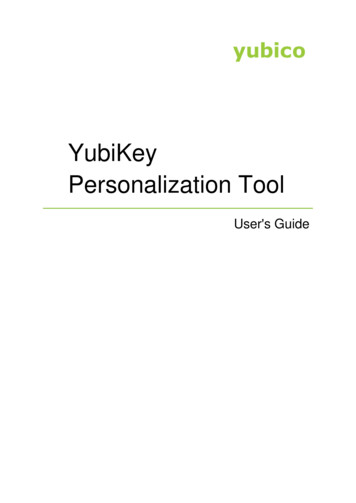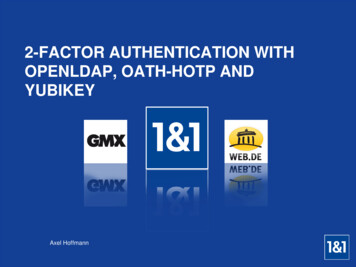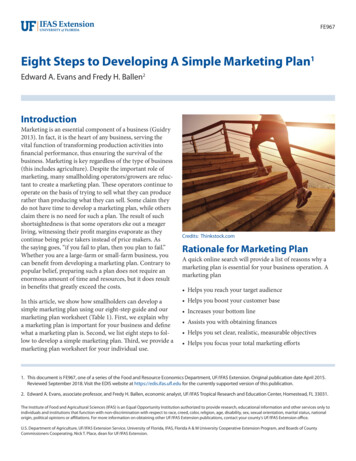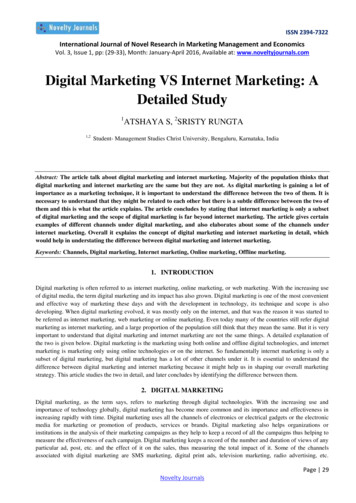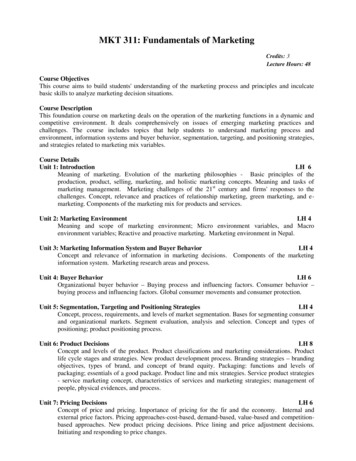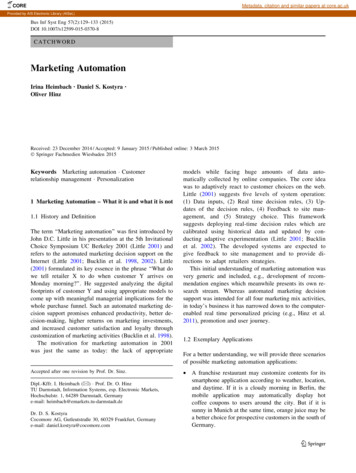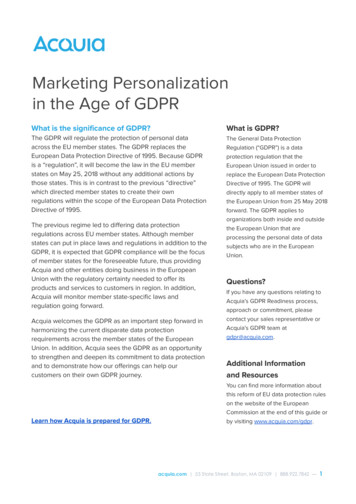
Transcription
Marketing Personalizationin the Age of GDPRWhat is the significance of GDPR?What is GDPR?The GDPR will regulate the protection of personal dataacross the EU member states. The GDPR replaces theEuropean Data Protection Directive of 1995. Because GDPRis a “regulation”, it will become the law in the EU memberstates on May 25, 2018 without any additional actions bythose states. This is in contrast to the previous “directive”which directed member states to create their ownregulations within the scope of the European Data ProtectionDirective of 1995.The General Data ProtectionThe previous regime led to differing data protectionregulations across EU member states. Although memberstates can put in place laws and regulations in addition to theGDPR, it is expected that GDPR compliance will be the focusof member states for the foreseeable future, thus providingAcquia and other entities doing business in the EuropeanUnion with the regulatory certainty needed to offer itsproducts and services to customers in region. In addition,Acquia will monitor member state-specific laws andregulation going forward.Acquia welcomes the GDPR as an important step forward inharmonizing the current disparate data protectionrequirements across the member states of the EuropeanUnion. In addition, Acquia sees the GDPR as an opportunityto strengthen and deepen its commitment to data protectionand to demonstrate how our offerings can help ourcustomers on their own GDPR journey.Regulation (“GDPR”) is a dataprotection regulation that theEuropean Union issued in order toreplace the European Data ProtectionDirective of 1995. The GDPR willdirectly apply to all member states ofthe European Union from 25 May 2018forward. The GDPR applies toorganizations both inside and outsidethe European Union that areprocessing the personal data of datasubjects who are in the EuropeanUnion.Questions?If you have any questions relating toAcquia’s GDPR Readiness process,approach or commitment, pleasecontact your sales representative orAcquia’s GDPR team atgdpr@acquia.com.Additional Informationand ResourcesYou can find more information aboutthis reform of EU data protection ruleson the website of the EuropeanCommission at the end of this guide orLearn how Acquia is prepared for GDPR.by visiting www.acquia.com/gdpr.acquia.com 53 State Street, Boston, MA 02109 888.922.7842 —1
How GDPR impacts organizations and their marketersWhile we cannot provide legal advice on the topic of GDPR, we can share guidance and bestpractices that we see in the market as it pertains to data collection and marketing personalization. Inthis guide, you’ll also learn how our own personalization products provide tools and controls to helpour customers configure their data collection responsibly.How GDPR affects data collectionGDPR is focused on the protection of the personal data of individuals in the European Union. Underthe GDPR, Personal Data is defined broadly in Article 4 (1) as follows:“[A]ny information relating to an identified or identifiable natural person (“data subject”); anidentifiable natural person is one who can be identified, directly or indirectly, in particular byreference to an identifier such as a name, an identification number, location data, an onlineidentifier or to one or more factors specific to the physical, physiological, genetic, mental,economic, cultural or social identity of that natural person.”The definition of personal data in the GDPR has been expanded to include any single identifyingpoint for a natural person to the already general use of personally identifiable information (PII)and personal data found in regulations and laws such as HIPAA, PCI, etc. Examples would be:name, personalized email address, mail address, phone number, dynamic and static IPaddresses. The effect on data collection is that the collection must be purposeful, with clearintent of use, transparent, as well as secure and legitimate, including receipt of an opt-in.Six principles as it pertains to personal dataProtecting PII is important, and there are severe penalties for not doing so. Organizations can befined up to the higher of 4% of annual global turnover (revenue) for breaching GDPR or 20Million. This is the maximum fine that can be imposed for the most serious infringements. It isimportant to note that these rules apply to both data controllers and processors.There are six principles mentioned to keep in mind with regards to personal data:1.2.3.4.5.6.Should be processed lawfully, fairly and in a transparent way.Should be collected for specified, explicit and legitimate purposeShould be kept up to date.Should be limited to what is necessary.Should not allow identification of people for longer than necessary.Should be processed in a way that ensures appropriate security.The GDPR strengthens the rights of individuals under the currently existing data protectionregulations, as well as giving new rights.What users need to opt-in toAny and all forms of data collection methods and purposes should be transparent and subjected toan explicit consent unless a contractual relationship justifies the collection of personal data in orderacquia.com 53 State Street, Boston, MA 02109 888.922.7842 —2
to fulfill the contract. The business purpose and intent of use must be clear and concise to the visitor.The visitor must have the ability to opt-out of one, some, and/or all forms of data collection andmethods of use once their data was collected by an explicit consent documented by an opt-in typically a check-box that is not pre-activated. At any time, the visitor has the ability to choose toopt-out (even if previously decided to opt-in) and has the right to request that one, some, and/or alltypes of personal data, methods of collection, or intention of use be deleted.How GDPR applies to Acquia’s products and servicesThe GDPR has different requirements depending upon whether an organization is a “controller” or a“processor” of the applicable personal data. As a global company, Acquia processes the personaldata of persons in the European Union, so will be subject to the GDPR. Acquia will be a controller forthe personal data which it collects in its own marketing, CRM, HR, finance and other internal systems.For its product and service offerings, however, Acquia will be a processor for personal data for whichour customers are the controller. Customers will collect personal information of individuals, theirclients, through their Drupal or other applications, which Acquia will then process through its digitalexperience products and services.Data controller (Our Customer) vs data processor (Acquia) responsibilityFor Acquia’s products and service offerings, GDPR is a shared responsibility with our customers. Thecontroller (i.e. Our Customer) is the entity that determines the purposes, conditions and means of theprocessing of personal data, while the processor (Acquia) is an entity which processes personal dataon behalf of the controller and subject to the controller’s instructions. We also call this the SharedResponsibility Model.We are a processor for Customer-collected data in Product Offerings. This is separate fromCustomer who is Controller for data collected on the front end of its digital experience. We processsuch data on behalf of our Customers as their technical vendor supporting their businesses using theacquia.com 53 State Street, Boston, MA 02109 888.922.7842 —3
data - always subject to their guidelines and instructions. In that context, the Customer will always bein control of what happens with such data. Because of the open source nature of Drupal, ourCustomers own their Drupal applications on our Acquia Cloud and Acquia Cloud Site Factoryofferings, as well as any data collected and stored through Acquia Lift and Acquia Journey.Therefore, each Customer must determine from its own technical point of view what personal dataare collected, stored and processed by our underlying platform offering to ensure GDPR complianceof the Drupal application.Using Acquia Lift and Journey for personalizationTo be clear, GDPR doesn’t prevent personalization, it simply provides controls and regulations aroundthe way marketers collect and use personal data.Marketers who are informed about GDPR will understand that as long as the marketer has receivedthe appropriate opt-in from a user and any gathering and use of personal data is justified forlegitimate business purposes and secured (via least privileged access, access control management,encrypted, pseudonymized, etc.), they may continue to gather data from users for marketing efforts.The biggest key here is that users must be aware that their data is being gathered, and know exactlywhat it's being used for and why, and they must have the option to opt-out of one, some, or all formsof data collection (e.g. you can collect my name and email but not my IP address). So long as this ismade clear to users, and the users have accepted the terms of use, companies may continue tocollect data as needed for use in marketing.GDPR allows for personalization based on cookies. Our products provide tools for our customers toconfigure data collection (such as the ability to: set cookie duration; set visitor to do not track;anonymize profile; hash any identifier). As a reminder, the customer is responsible for compliance ofits Acquia Lift or Journey implementation and configuration using the tools provided by our productoffering. For instance, the customer will need to comply with applicable requirements such astransparency of cookies, user consent etc. We define “visitors” as the people our customers areusing our products to collect data about and build personalized experiences towards. While AcquiaLift captures basic page level data, PII like an email address is up to the customer. Lift collects IPaddresses for geo location, but this information isn't stored on a unified customer profile, meaningthat it cannot be associated with a person.Visitor data rightsThere are eight visitor data rights for which marketers will be responsible: the right to be informed;right to restrict processing; right to access; right to rectification; right to erasure, right to dataportability; right to object; rights in relation to automated decision making and profiling. Below you’llfind a description of these rights, along with what is the customer responsibility as the data controller,versus Acquia’s responsibility as the data processor.Visitor Data RightsDescriptionCustomer ResponsibilityAcquia ResponsibilityRight to beinformedThe right to be toldwhat data will becollected, why, bywhom, for whatCustomer should inform visitorsof what and how data is collectedusing Acquia Lift and Journeythrough website notification.Acquia provides documentationon what data can be collectedand gives Customer full controlof what data they are pushingacquia.com 53 State Street, Boston, MA 02109 888.922.7842 —4
purpose and wheredata will gointo Profile Manager and how itis stored.Right to restrictprocessingThe right to pause theprocessing of thedata if there aregrounds to do soCustomer can and shouldimplement a button or someother type of option on thewebsite to allow visitors to opt inor out of tracking.Acquia provides a do not trackmethod by which Customer canimplement do not track into theirapplications by individual visitorprofiles.Right to accessThe right to see thepersonal data that arebeing held about thedata subjectCustomer can implement a formusing the visitor query APIfunctionality where visitors canlook up data being collected onthem. Alternatively, Customercould require visitors to requesttheir data and Customer canthen manually retrieve it via theAPI.Acquia Lift provides the visitorquery endpoint via the DecisionAPI or Profiles API, which allowsCustomer to retrieve any desiredinformation about an individualvisitor. This API can return anycombination of a visitor’sidentifiers, person, touch, orevent data.Right torectificationThe right to correctdata if they are wrongor inaccurateCustomer can build a form whichpulls data from the profile usingVisitor Query, then allow thevisitor to update it, after which itcan be pushed back into thevisitor profile via the CaptureAPI.Acquia provides the CaptureAPI method which enablesCustomer to modify any datastored in visitor profiles.Right to erasureThe right to havepersonal dataremoved when theyare no longernecessaryCustomer can and shouldimplement a button or option toallow visitors to purge theidentifying information.Acquia provides a purge personfunction which enablesCustomer to completely removeany identifiers from a givenvisitor profile.Right to dataportabilityThe right to allowindividuals to obtainand reuse theirpersonal data for theirown purposesCustomer can use the VisitorQuery function within theDecision API or Profile API to geta formatted copy of all availableprofile data to provide to anindividual.Acquia Lift provides the visitorquery endpoint via the DecisionAPI or Profiles API, which allowsCustomer to retrieve any desiredinformation about a visitor. ThisAPI can return any combinationof a visitor’s identifiers, person,touch, or event data.Right to objectThe right to object toprocessing personaldata includingprofilingCustomer can and shouldimplement a button or someother type of option to allowvisitors to opt in or out oftracking. If a visitor opts out oftracking, they also won’t bepresented personalized content.Acquia provides a do not trackmethod by which Customer canimplement into their applicationsto set individual visitor profiles tonot track information.Rights in relationto automateddecision makingand profilingThe right to rejectbeing subject todecisions madebased uponautomatedprocessing, withoutexplicit consentCustomer can and shouldimplement a button or someother type of option to allowvisitors to opt in or out oftracking. If a visitor opts out oftracking, they also won’t bepresented personalized content.Acquia provides a do not trackmethod by which Customer canimplement into their applicationsto set individual visitor profiles tonot track information.acquia.com 53 State Street, Boston, MA 02109 888.922.7842 —5
Additional information and useful resourcesYou can find more information about this reform of EU data protection rules on the website of theEuropean Commission (see links below). If you have any questions relating to Acquia’s GDPRReadiness process, approach or commitment, please visit www.acquia.com/gdpr or contact yoursales representative or Acquia’s GDPR team at gdpr@acquia.com.Acquia’s Privacy cy-policyAcquia’s GDPR resources:www.acquia.com/gdprAcquia’s certification for the EU-U.S. Privacy d a2zt00000004FE2AAM&status ActiveEuropean Commission – data transfers outside the ernational-transfers/index en.htmEuropean Commission – reform of EU data protection reform/Contact us todayTo learn more about how Acquia is preparing for GDPR, please visit Acquia’s Privacy y-policy or contact us at gdpr@acquia.com.acquia.com 53 State Street, Boston, MA 02109 888.922.7842 —6
Customers own their Drupal applications on our Acquia Cloud and Acquia Cloud Site Factory offerings, as well as any data collected and stored through Acquia Lift and Acquia Journey. Therefore, each Customer must determine from its own technical point o f view what personal data


